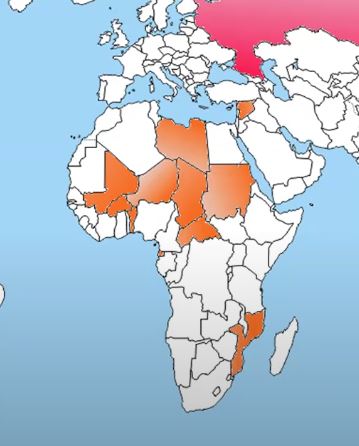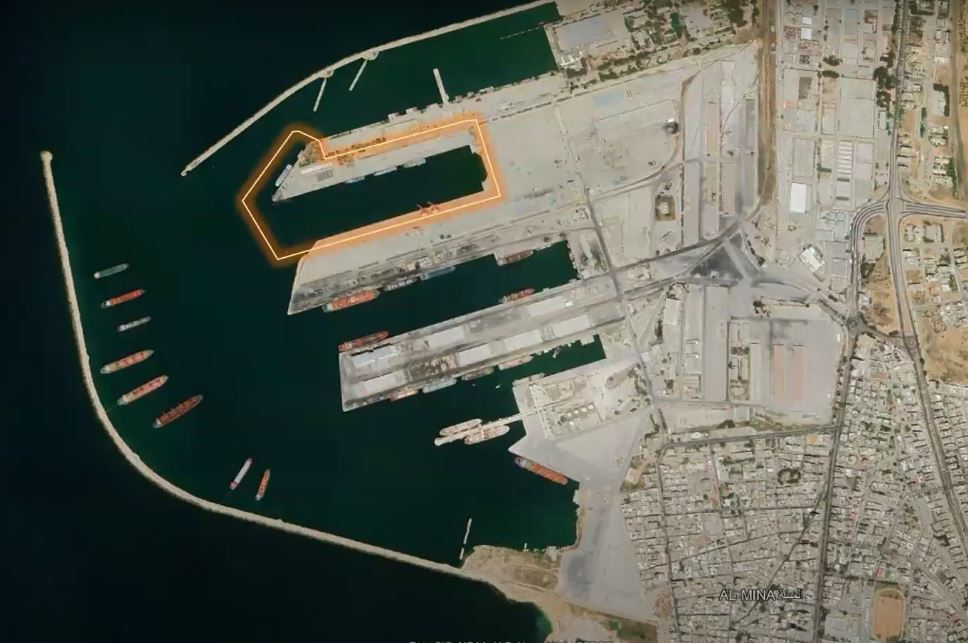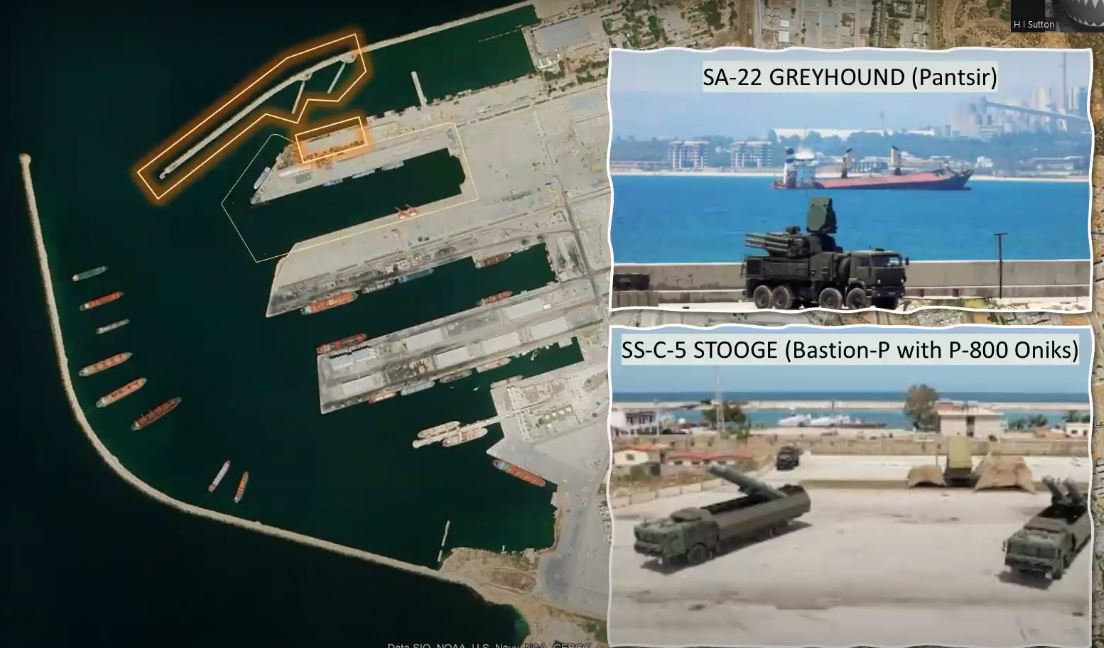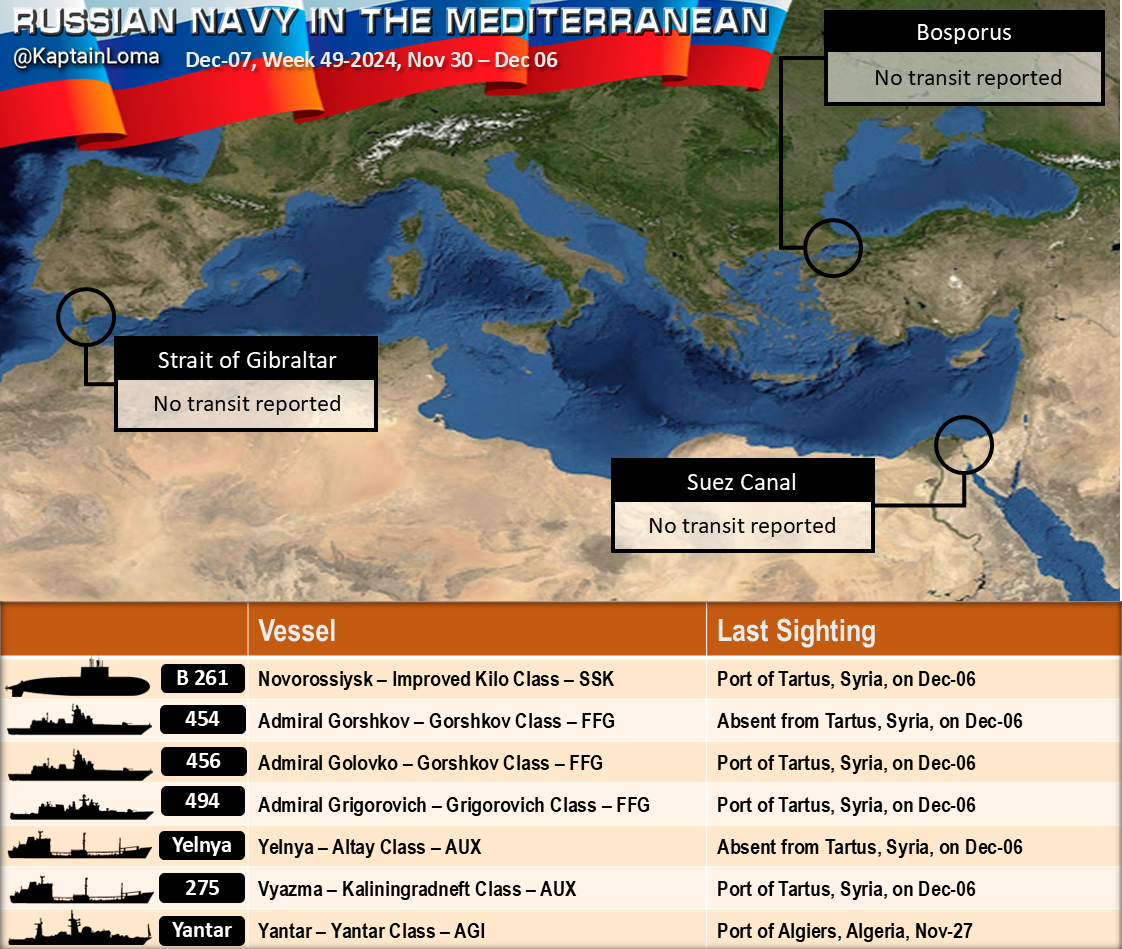
Russia’s African presence at risk from potential Syria naval base loss, expert says
Independent naval analyst H.I. Sutton reports that Russia’s ability to maintain its military presence and influence in Africa faces a significant challenge as its naval base in Tartus, Syria, comes under threat amid the fall of the Assad regime.
This morning, Bashar al-Assad, who ruled Syria for 24 years, fled the country. This marks a major setback for Russia, whose military intervention over the past 10 years sustained Bashar al-Assad’s regime in exchange for access to the Tartus port and Khmeimim airbase for operations in the Middle East and Africa.
According to Sutton, Tartus, Russia’s most important naval base outside its territory, hosts the permanent Mediterranean Sea task force.
The base accommodates several crucial military assets, including cruise missile-capable warships, Kilo submarines, and essential auxiliary vessels like oilers.
The facility also features a coastal battery with Onyx missiles and air defense systems.
The analyst indicates that Russia’s current Mediterranean presence consists of “one submarine, three frigates, two auxiliaries, and a spy ship.”
Territorial changes
In 10 days of the offensive from the north, the Syrian opposition forces have captured major Syrian cities including Aleppo, Homs, and Damascus, leaving Russian coastal assets in one of the last regime-held areas on the Mediterranean coast in the country’s northwest. Syria’s dictator, Bashar al-Assad fled Damascus on the morning of 8 December and in the evening, the Russian news agency TASS reported that he arrived in Moscow with his family and was granted asylum.
Two key Russian bases are located in two coastal provinces of Syria, a naval base in Tartus, and the Khmeymim airbase in Latakia.
The opposition uprising has reached Tartus itself, as evidenced by videos showing the toppling of former President Assad’s statue in the city:
Signs of evacuation from the naval base
While noting signs of Russian evacuation, Sutton observes there has been some back-and-forth movement with shows of force since 3 December. However, he suggests these demonstrations are “aimed more at the Western audience and the internal Russian audience than anyone in Syria.“
As reported earlier, several ships left the Tartus base a few days ago, satellite imagery showed. This morning, Ukraine’s Defense Intelligence confirmed the ongoing evacuation of the base, adding that Russia also airlifts remaining weapons and equipment, using the Khmeymim base.
Russia’s African operations impact
Regarding the potential impact of the Assad regime fall for Russia, Sutton notes:
“What does this mean for Russia? The most obvious impact is losing their naval base in the Mediterranean. However, it will also weaken their position in Africa. Russia has been heavily focused on turning African governments in their favor, primarily through the supply of military assistance.”

a whole of Africa different shades of orange,” H.I.Sutton notes. Screenshot from H.I Sutton’s video.
The Syrian bases have been crucial for supplying military assistance to various African nations, with transport aircraft using Syrian facilities for refueling.
Without this base, Russia would need to develop alternative routes or establish new naval bases in countries like Libya, Sudan, or Equatorial Guinea – options that Sutton notes would “take time and money.”
The analyst highlights that Russia’s civilian vessels, known as the “Tartus Express” or “Syria Express,” previously connected Tartus with Russian and Russian-occupied Black Sea ports to transfer equipment and personnel to Syria. However, due to Russia’s all-out war in Ukraine, these vessels must now take a longer route. Should Russia lose access to the base, Sutton warns they might have to abandon equipment if they cannot get ships in to retrieve it.
Implications for Ukraine
Regarding the Ukrainian context, Sutton assesses that Russia is “undoubtedly weakened” and now faces “competing crises.” He notes that Ukraine’s successful Black Sea campaign has already complicated Russia’s naval operations, forcing supply routes to take longer alternative paths.
He adds that these developments might affect Russia’s influence in gold mining operations and trade with the Global South, potentially creating new opportunities for Ukraine in trade and diplomacy.
Related:

















